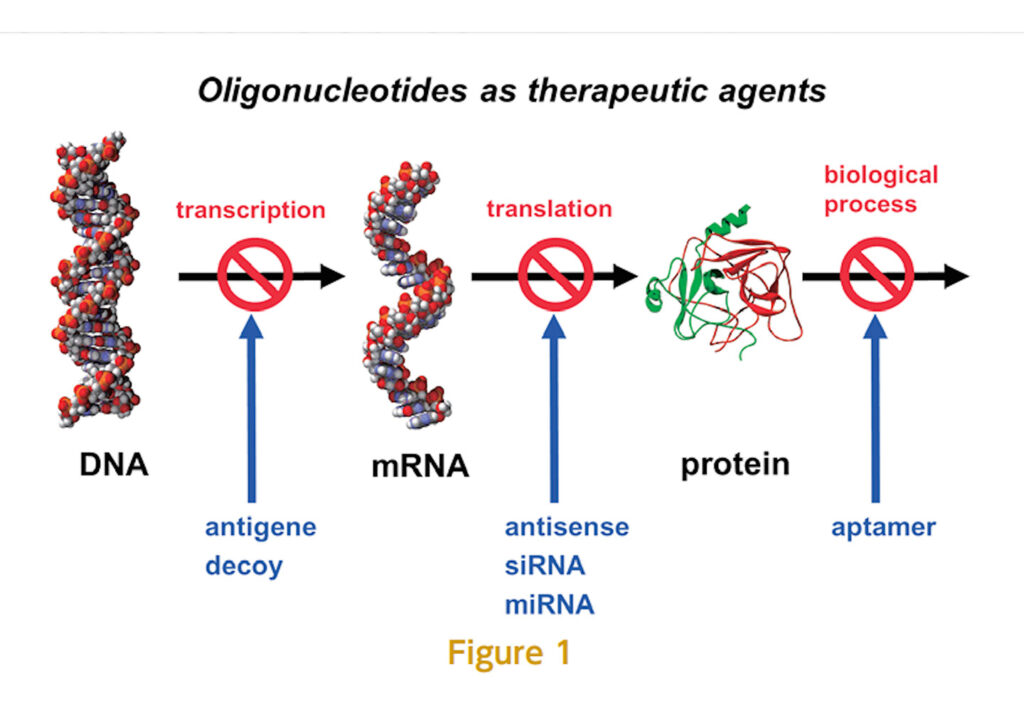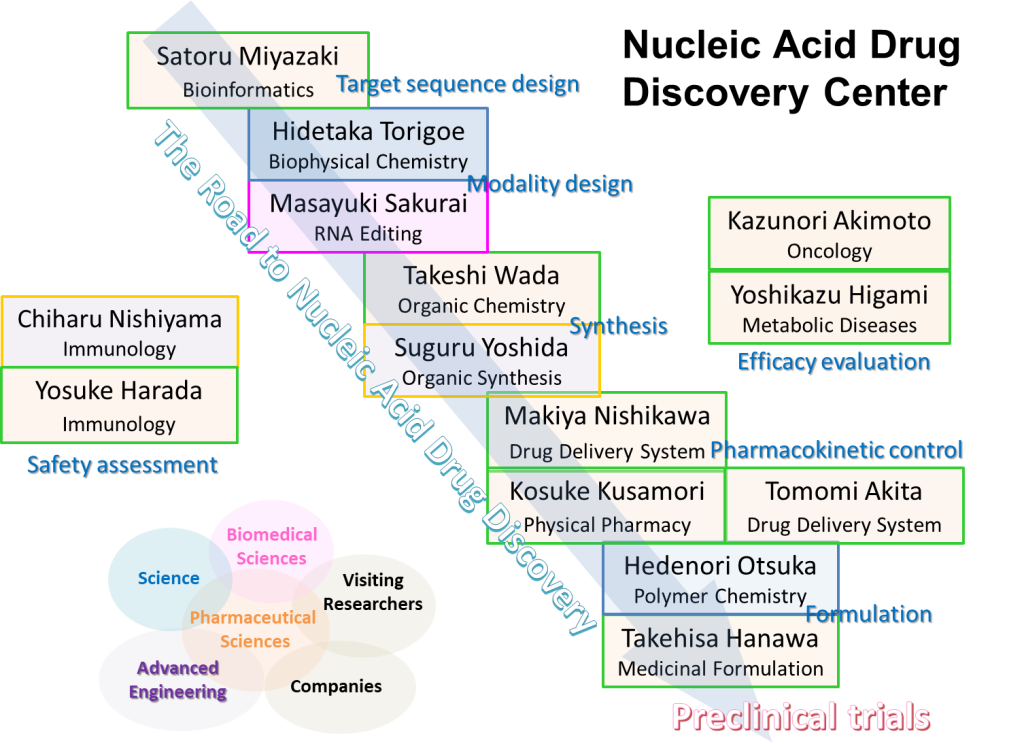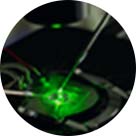Development of nucleic acid-based drugs that are expected to be a next-generation drug
History of This Center
Among the activities of the Translational Research (TR) Center, which was headed by Prof. Yoshikazu Higami from 2014 to 2018, the field of nucleic acid medicine-related research has been particularly outstanding and is one that has attracted social attention and demand today. Our university has several
researchers who are active worldwide in the field of nucleic acid drug discovery, and they all participated in research as members of the TR Center. In 2017, the Nucleic Acid Drug Discovery DDS Discussion Group was established, represented by Prof. Makiya Nishikawa, and researchers involved in nucleic acid medicine at our university gathered to discuss the development of nucleic acid medicine. As a result, the Nucleic Acid Drug Discovery Research Division was launched in April 2019 as the successor to the TR Center. After the three-year establishment period ended, the period was extended for another two years.
In 2021, the head of the department, Prof. Wada, was selected for the“ Innovative Next Generation of Oligonucleotide Therapeutics (INGOT) Project,” one of the research projects in the “Drug Discovery Platform Technology Development Project for the Realization of Next-Generation Treatment and Diagnosis (RNA Targeted Drug Discovery Technology Development)” promoted by the Japan Agency for Medical Research and Development (AMED), and has achieved remarkable achievements.
As such, research is progressing and accelerating, so we plan to reorganize the research department into a research center, which will be launched in April 2024. In addition, based on the research results of the
department, a drug discovery venture was established in September 2023 with researchers from our university, the University of Tokyo, Keio University, and Tokyo Medical and Dental University as founders. In addition, we work closely with the “Nucleic Acid and Peptide Drug Discovery and Therapeutic Research
Center (TIDE Center)” established at Tokyo Medical and Dental University (Institute of Science Tokyo), aiming to form a base for nucleic acid drug discovery in the Tokyo Biocommunity (GTB).
Research Objectives
Nucleic acid drugs are medicines consisting of chemically synthesized DNA or RNA derivatives, and target DNA, RNA or proteins related to diseases (Figure 1).
Therefore, a wide range of research fields are required for the development of nucleic acid drugs, but our university has extremely excellent researchers in each field, and by bringing them together at this center, we can expect a great synergistic effect of promoting the development of our own nucleic acid drugs.
Our research center aims to develop new nucleic acid derivatives that are more effective, stable, and safe than conventional nucleic acid drugs, and to establish new carrier molecules and formulation technologies that bind to nucleic acids to improve stability and pharmacokinetics. In addition, we aim to select disease areas related to cancer, the immune system, and the metabolic system as targets for these nucleic acid drug molecules, and to lead to the development of treatments using new nucleic acid drugs. In this way, it is expected that our excellent researchers involved in nucleic acid drug discovery will gather in this department and promote the development of original nucleic acid drugs for unique targets.

Members
In-house Members
Faculty of Pharmaceutical Sciences
Takeshi WADA (Organic chemistry)
Makiya NISHIKAWA (Drug delivery system)
Takehisa HANAWA (Medicinal formulation)
Yoshikazu HIGAMI (Molecular pathology and metabolic diseases)
Kazunori AKIMOTO (Molecular pathology)
Yosuke Harada (Immunology)
Kosuke Kusamori (Physical pharmacy)
Tomomi Akita (Drug delivery system)
Faculty of Science
Satoru MIYAZAKI (Bioinformatics)
Hidetaka TORIGOE (Biophysical chemistry)
Hidenori OTSUKA (Polymer chemistry)
Faculty of Advanced Engineering
Chiharu NISHIYAMA (Immunology, allergy and molecular biology)
Suguru YOSHIDA (Organic synthesis)
Research Institute of Biomedical Sciences
Masayuki SAKURAI (RNA editing)

Current Situation of Nucleic Acid Drugs and Our Research Topics
Nucleic acid-based drugs are anticipated to be an epoch-making remedy for the treatment of intractable hereditary diseases. The global market size of nucleic acid-based drugs is predicted to expand to 19 billion dollars in 2030 from 2 billion dollars in 2018, according to the estimation of Seed Planning Inc., a marketing research and consulting enterprise. Although much effort has been devoted to the research of nucleic acid-based drugs, only 17 drugs have been approved so far. There are a lot of challenges to overcome for the development of potent nucleic acid drugs, and a breakthrough is required for further progress in this area. To address this issue, we are dealing with the following topics;
- Development of an efficient method to synthesize boranophosphate oligonucleotides which is anticipated as an alternative candidate of phosphorothioate
- Establishment of a scalable synthetic method of artificial cationic oligosaccharides and peptides that bind to and stabilize nucleic acids.
- Construction of a highly target selective drug delivery system through the elucidation of interaction between nano-structured nucleic acid and cells
- Development of antisense drugs that target such as wound and bladder cancer remedy
- Development of a novel formulation method of nucleic acid drug
- Research on the control of aging, aging related diseases and metabolic abnormalities by nucleic acid drugs
- Development of nucleic acid drugs which regulate autoimmune response and rejection reaction during an organ transplantation
- Development of effective breast cancer drugs using novel artificial cationic molecules and siRNAs
- Establishment of investigation technology via bioinformatics and AI to determine the sequence of a mRNA that codes disease-related protein









